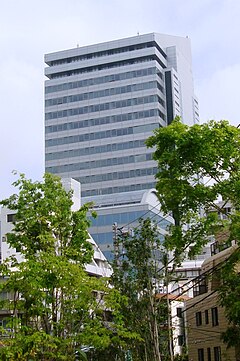Amuse Inc.
 | |
 Amuse headquarters in Shibuya, Tokyo in 2012 | |
Native name | 株式会社アミューズ |
|---|---|
Romanized name | Kabushikigaisha Amyūzu |
| Company type | Public K.K. |
| TYO: 4301 | |
| ISIN | JP3124500004 |
| Industry | Entertainment |
| Founded | October 16, 1978[1] |
| Founder | Yokichi Osato[2] |
| Headquarters | Shibuya, Tokyo, Japan |
Area served | Asia[3] |
Key people | Yokichi Osato (Chairman) Masaki Nakanishi (President) |
| Revenue | |
| Total assets | |
| Total equity | |
Number of employees | 264 (385 in Amuse Group)[4] As of March 31, 2017[1] |
| Subsidiaries | Taishita Label Music (joint venture with Victor Entertainment) Amuse Quest TOKYO FANTASY Inc. A-Sketch (joint venture with KDDI) Amuse Edutainment Geishin Creative Tokyo J-Feel Brussels Co., Ltd. Kirei Inc (U.S.A.) Amuse Korea Beijing Geishin Theatrical Art Production Geishin Creative Shanghai Live Viewing Japan New Japan Pro-Wrestling (5%) |
| Website | amuse |
Amuse Inc. (株式会社アミューズ, Kabushikigaisha Amyūzu)[5] is a Japanese entertainment company that provides artist management services. The artists include idols,[6] musicians, and so on.
Amuse produces TV and radio programs, commercial films, and movies. Other interests are in publication, music software, and patent agent businesses. The private Amuse Museum, located in Asakusa, Tokyo, was owned by the company. It featured ukiyo-e and textile displays.
History
[edit]Amuse Inc. was created in 1978 when it signed with the rock band Southern All Stars. Soon after in 1981, the company created its movie production and distribution subsidiary Amuse Cinema City Inc. and produced Morning Moon Wa Sozatsu Ni (starring Shin Kishida) that same year, followed by Aiko 16 sai (1983). In 1983, Amuse signed with the actress Yasuko Tomita. The next year, the firm opened its subsidiary in the United States.[7]
Amuse Video Inc. was created in 1990 as the video software production and sales subsidiary of the company. In 1995, Amuse established Ayers Inc. through a joint venture with Bandai, and opened its first movie theater. In 2000, Amuse opened its Korean subsidiary, Amuse Korea Inc. On 20 September 2001, Amuse was listed on the Osaka Securities Exchange. Its distributed film The Pianist won the Palme d'Or at the 2002 Cannes Film Festival.[7]
In 2004, Amuse opened its e-commerce site, Ambra. In 2007, it established its music label Taishita in joint venture with Victor Entertainment. In 2008, the group invested in Brussels Co. Ltd., a company that develops Belgian beer bars. In 2009, the group launched its subsidiary Amuse Edutainment Inc. In 2012, Amuse Singapore was created. Amuse intended to give a second life to J-pop by promoting the bands Flumpool and Weaver.[8] In 2013, it produced and distributed the movie The Eternal Zero. In 2015, Amuse France Inc. was created.[7]
In January 2016, Amuse established a partnership with New Japan Pro-Wrestling, a promotion in which Amuse owns shares.[9][10] In the US, Amuse launched J-Creation to further develop ties between the Japanese and American entertainment industries. In October 2018, Amuse USA released the graphic novel Apocrypha: The Legend of Babymetal.[11]
In 2022, Amuse founded Kulture Inc., aiming to create next-generation entertainment with Web3 and metaverse content, such as NFTs.[12]
Notable artists
[edit]- @onefive
- Airi Matsui
- Akane Sakanoue
- Alissa Yagi
- Anna Yamada
- Asami Tano
- Asterism
- Ayaka Miyoshi
- Babymetal
- Begin
- Cross Gene
- Dean Fujioka
- Dori Sakurada
- Eri Fukatsu
- Eri Murakawa
- Erika Yamaguchi
- Flow
- Flumpool
- Frederic
- Gen Hoshino
- Hinata Satō
- Jun Yoshinaga
- Junko Takeuchi
- Juri Ueno
- Kaori Asoh
- Kaori Maeda
- Kaya Kiyohara
- Kenta Izuka
- Kento Kaku
- Mafumafu
- Manaki Reika
- Masaharu Fukuyama
- Mayu Hotta
- Noa Kazama
- Perfume
- Porno Graffitti
- Reina Triendl
- Rie Takahashi
- Riisa Naka
- Ruito Aoyagi
- Ryo Yoshizawa
- Ryohei Otani
- Sakura Fujiwara
- Sakura Gakuin
- Shit Kingz
- Shogo Sakamoto
- Shouma Kai
- Shuhei Nomura
- Southern All Stars
- Takuya Mizoguchi
- Takuya Terada
- Team Nacs
- The Oral Cigarettes
- Yui Mizuno
- Yuka Itaya
- Yuriko Yoshitaka
- Yuta Hiraoka
- Yuta Koseki
- Yuya Matsushita
Former artists
[edit]Other holdings
[edit]Amuse Models
[edit] | |
| Company type | Division |
|---|---|
| Industry | Fashion |
| Parent | Amuse, Inc |
Amuse Models is a division of Amuse that was founded in 2004. Its division for child talents is sometimes called Amuse Kids. In 2014, Amuse merged with Will Corporation and then established the modeling agency, which mainly consists of teenage talents. Talents who belonged to Amuse after their merger with Will Corporation include Juri Ueno and Yuriko Yoshitaka.
See also
[edit]Notes
[edit]References
[edit]- ^ a b "Corporate Profile". AMUSE INC. Retrieved 2018-03-23.
- ^ "Message From Management". AMUSE INC. Retrieved 2016-04-03.
- ^ Herskovitz, Jon (2000-12-26). "J-Pop Takes Off / Japanese music, movies, TV shows enthrall Asian nations". The San Francisco Chronicle. Archived from the original on 2016-06-30. Retrieved 2009-02-05.
- ^ This figure does not include part-time and temporary workers.
- ^ Kageyama, Yuri (2005-08-10). "Musicians try to join Apple's iTunes in Japan". USA Today. Retrieved 2009-02-05.
- ^ "アミューズモデルス". Amuse.co.jp. Archived from the original on 2009-02-04. Retrieved 2009-02-05.
- ^ a b c "History". Amuse.co.jp. June 2017. Retrieved 4 November 2018.
- ^ Jeanette Tan (5 September 2012). "Is Singapore ready for the 'new J-pop'?". Yahoo.com. Retrieved 4 November 2018.
- ^ 新日本プロレスが大手芸能プロダクション『アミューズ』との業務提携を発表!. New Japan Pro-Wrestling (in Japanese). 2016-01-05. Retrieved 2016-01-06.
- ^ Soumik Datta (14 May 2018). "NJPW News: New Japan Pro Wrestling hires a new president". Sportskeeda.com. Retrieved 4 November 2018.
- ^ "J-CREATION: A Chance for American Filmmakers and Developers to Tap Into Japan's Most Beloved and Popular IP". Comicsbeat.com. 1 June 2018. Retrieved 4 November 2018.
- ^ "テクノロジーとの融合で新たなエンターテインメント創出を目指す新会社「株式会社Kulture」及び、Web3・メタバース特化ファンド「KultureFUND」を設立。設立記念NFTの販売もスタート!". PR Times (in Japanese). 2022-06-24. Retrieved 2024-10-21.
